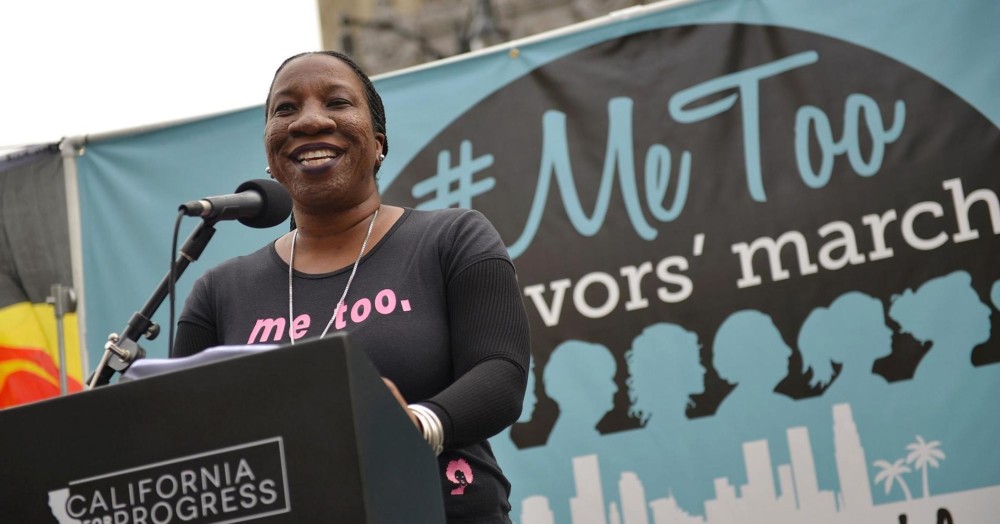By Pam Kragen
The San Diego Union-Tribune
WWR Article Summary (tl;dr) In a speech before a capacity crowd at Cal State San Marcos Tuesday night, ‘Me Too’ founder Tarana Burke called the new conversation on sexual violence “nothing short of a miracle.”
The San Diego Union-Tribune
In October 2017, the Me Too Movement exploded into the public consciousness when survivors of sexual violence flooded social media with their own painful stories and the hashtag phrase #metoo.
The movement has since gone global and taken down many confessed and alleged perpetrators. For Tarana Burke, the Bronx-born civil rights activist who founded the movement back in 2006, the experience over the past 18 months has been a roller-coaster with hair-raising highs and depressing lows.
The upside has been the awareness-raising on the issue and the communities of healing that have sprung up to validate and heal victims. But the valleys have included the backlash from conservative pundits and the media’s misrepresentation of the movement and its goals.
In a speech before a capacity crowd of 850 at Cal State San Marcos on Tuesday night, Burke called the new conversation on sexual violence “nothing short of a miracle.” But she said that society is nowhere close to ending the predatory behavior that spawned Me Too and the healing of its traumatized victims.
“The people who said ‘me too’ a year-and-a-half ago are still walking around out there with their hand up waiting for someone to say ‘I can help you, I see you, I believe you … me too,'” she said, to a standing ovation.
Burke spoke to a diverse audience of mostly women students, faculty and community members as part of the university’s spring lecture series.
During the nearly two-hour presentation, she talked about her childhood, the steps that led to her creation of Me Too and how it felt when a group of wealthy Hollywood actresses commandeered her catchphrase in October 2017 to take down film producer Harvey Weinstein.
She’s not angry at the actresses for latching on to her words, and said they’ve been gracious in sharing the microphone. But she’s sorry that fewer people wanted to listen when she founded the movement to heal traumatized young “black and brown girls” 13 years ago.
“Rich, white women had to speak up for something to happen,” she said Tuesday. “I tell people, you can’t steal what’s mine. I’m here for a particular reason and nobody can take that away from me.”
Burke grew up the well-read liberal daughter of a black feminist single mom. She was sexually abused as a girl but never talked about it. By age 15, she was a community youth activist, helping organize rallies in support of the Central Park Five, five black teen boys unjustly convicted of the 1989 rape of a white woman in Central Park. They were later exonerated.
At age 22 in 1996 she was working at a camp when a preteen girl nicknamed “Heaven” confessed she had been sexually abused by her stepfather. Because it stirred up her own painful memories, Burke didn’t respond.
“I wanted to say ‘me too’ but I didn’t,” Burke said. “(Heaven) was shocked, angry, disappointed. Then she put her armor back on and walked away.”
That experience led to the creation of Just Be, a program for minority girls ages 12 to 18 encouraging healthy relationships, self-esteem and education about sexual consent. The need was great. Burke said 60 percent of black girls will experience sexual violence by age 18. In 2006, Me Too was born to raise awareness about the pervasive culture of sexual abuse and assault.
Originally launched with a MySpace page, Burke’s Me Too Movement has helped hundreds of women nationwide. But its numbers pale in comparison to the millions reached since #metoo began in 2017. Burke was among the “silence breakers” women named Time Magazine’s 2017 Person of the Year.
Burke told the audience the movement continues. She recommends campuses like Cal State San Marcos make ending sexual violence part of their campus cultural motto.
She believes education on sex and consent should begin in kindergarten. And she encourages marginalized populations like the transgender community to “live out loud” to raise awareness.
Natalie Wilson, a professor of women’s gender and sex studies at Cal State San Marcos, said she wasn’t surprised at the large crowd Tuesday because Burke has helped create a dialogue on campuses for these difficult conversations.
“We have to take the opportunity to keep pressing it forward in our community. This is the generation that’s going to run with it,” Wilson said.
Among the students in attendance was senior Gaiti Ayub, who spent eight years in the U.S. Army.
“That wasn’t a good time for women in the Army,” Ayub said. “They didn’t tell their stories. They were hushed up. The Me Too movement made a difference. I feel it builds a safe space for women.”
Burke’s talk also spurred at least one attendee to action. Rebecca James, a senior in the communication department, spent many years in the Girl Scouts and served as a troop leader and delegate to the national convention. But she was rebuffed when she urged the organization to introduce sexual health training classes.
“Now I’m looking to find an organization where that can be part of the conversation,” James said.














































































































































































































































































































































































